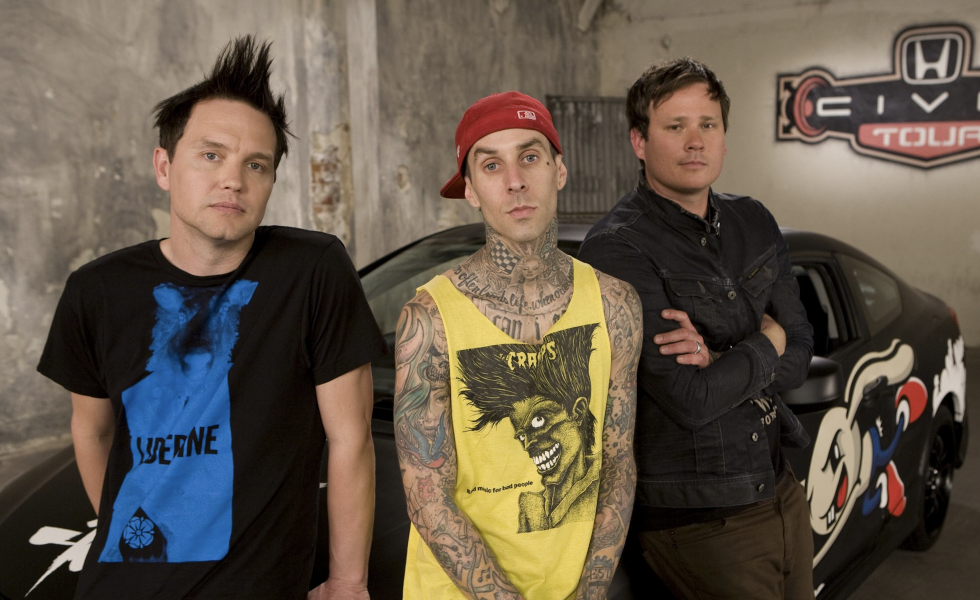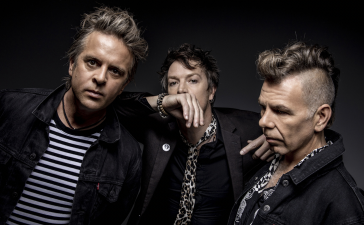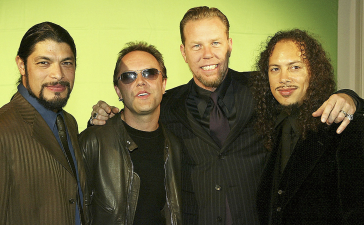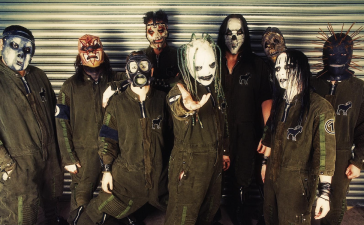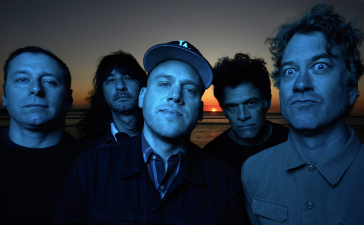Say what you will about their last couple of albums – back in the day, Blink-182 were downright untouchable.
Sure, they were the kind of band that wrote songs called ‘Fuck A Dog’ and ‘When You Fucked Grandpa’, then put them both on an album called Take Off Your Pants And Jacket. But they were also the kind of band that got away with shit like that, because their talent otherwise was simply undoubtable. There would be no pop-punk in 2021 if it weren’t for the hits Blink cranked out in the late ‘90s. With epochal breakout hits like ‘Dammit’, ‘All The Small Things’ and ‘What’s My Age Again?’, the trio cemented a status of idolatry that few bands have been able to match – not just in rock, either, but in music altogether.
So when Blink-182 announced their breakup in 2005, the music industry was shaken to its core. And when they reunited four years later, it was the second coming of Jesus Christ – but, like, Jesus’ high-school-dropout brother who still had a thing for dick jokes in his mid-30s. Blink-182 made their monolithic return to the stage in February of 2009, announcing their comeback at that year’s Grammy Awards. After a short two-year run on the touring circuit, they dropped the bombshell that fans had been holding their breaths for the entire time: a new album was indeed on the way.
Words could never do justice to the hype surrounding 2011’s Neighborhoods. And even if it wasn’t the critical darling everyone was hoping for, the LP has gone on to become a bonafide cult classic over the past decade. Right before it came out, BLUNT got down to wire with frontman Mark Hoppus to unpack the album’s origins.
THE PEOPLE IN YOUR NEIGHBORHOODS
It might have taken a plane crash to make it happen, but Blink-182 are back. On the eve of the release of Neighborhoods, Andrew P Street talks to Mark Hoppus about his band’s second coming.
When most people think of Blink-182 it’s of the carefree, piss-taking trio of ‘What’s My Age Again?’ and ‘All the Small Things’ gurning at the camera and leaping around to their infectious – and platinum-selling brand of pop-punk.
However, the last decade hadn’t been quite so playful: after 2003’s brooding, surprisingly experimental self-titled album came a fraught world tour (during which drummer Travis Barker broke his foot in Melbourne, causing the cancellation of the rest of the Australian shows) that lead to guitarist/singer Tom DeLonge announcing his resignation in 2005, It was sudden and brutal: he immediately cut off all contact with his bandmates and began a war of words in the press as he formed his new band, the underwhelming Angels and Airwaves.
Barker and bassist/singer Mark Hoppus followed suit with +44 and Barker became a reality television star with the excreble ‘Meet the Barkers’, following his 2004 wedding and short-lived marriage to Shanna Moakler, 1995’s Miss USA (and December 2001’s Playmate of the Month). +44 wound down, Hoppus moved into production, DeLonge continued ploughing the A&A furrow, and that could well have been the end of it. Fate, however, had other ideas.
The band’s annus horribilis came in 2008: Jerry Finn, who’d produced every Blink-182s album since 1999’s
breakthrough Enema of the State, died after suffering a brain haemorrhage at the age of 39. Worse was to come: on 19 September a private jet carrying Barker and his friend and collaborator Adam Goldstein (aka DJ AM) crashed during take off, killing both pilots and two passengers, with both Barker and Goldstein suffering severe injuries and horrific burns. The following year, Goldstein died of an accidental overdose when the cocaine in his system reacted badly with his prescription pain medication.
>> KEEP READING: The Beths: Tour bus gazers <<
However, the crash did have one positive outcome: it was the catalyst for Barker, De Longe and Hoppus to put aside their differences and start talking again. The trio announced their reunion in 2009 and the slow gestation of album #6, Neighborhoods. A relieved sounding Mark Hoppus talks about how they picked up the pieces.
You guys were pretty brutal about each other in the press after the split, especially Tom: was there a lot to get over when you decided to get back together?
No, there wasn’t. I think that by the time we were ready to reform as a band and we were talking after five years of not speaking, that it went pretty easily. We were more laughing about the stuff that we said about each than welling on it in any way.
Did you feel that Blink were over when Tom left, or did you think it was just a hiccup?
Um… somewhere in between. I mean, it was obviously a very acrimonious time in the band leading up to that point, but I was actually really surprised when he actually walked away. That was surprising to me.
It did seem a shock you’d always come across as great mates.
Oh yeah. We’ve always been good friends, right up until the end of the first incarnation of Blink I think we were all great friends. I think it was only the last six months that it started to deteriorate.
So was Travis’ accident the turning point?
Personally, by that point I was pretty much over all the nonsense and was ready to at least talk as friends again. I think that moment came for Tom when he saw on the news that Travis was in that plane crash: it was at that moment that he really wanted to reach out and reconnect in some way.
Well, something like that certainly puts things in perspective.
Oh, for sure, definitely. When something that terrible happens it’s like all of the other arguments and differences that we had in Blink are just so miniscule in comparison to the fact that we all are friends and went through a lot together, you know?
Talking as friends is one thing, but at what point did that extend to “let’s get in a room together and play music again?”
It was probably a few weeks after we started talking again. We were hanging out – Tom had come up to LA a couple times, we’d hung out at Travis’ house and at our studio and talked on the phone pretty much every day, and it was obvious that there was this thing that we weren’t talking about. Tom was the first one to bring it up: he just said what should we do about Blink?” and I said “I think we should get back together because it was so much fun and everybody’s in the same place at the same time.’
Surely that was a daunting prospect?
It wasn’t. We decided “OK, let’s keep doing Blink,” and within days we were back in the studio starting to write new music. The only thing was at first was that the ideas were great but we were all very polite to one another. Too muchso, in fact.
How do you mean?
See, we were still trying desperately to protect this spark of Blink-182 and for us to be in a band together we need to be able to speak honestly about ideas and have a difference of opinion and not worry that it’s going to break our band apart. So we just wanted to get we went out on tour right after back to being a band, so that’s why we got back together.
It’s an interesting question: how does a band get back to the point where you can say “hey, that idea’s no good” without being scared that it’ll split the band up again?
Exactly. There’s a certain level of tension that is necessary for Blink to operate correctly. There’s a difference in the opinion between me and Travis and Tom that makes Blink what it is – the struggle between our different ideas pulling on a song is what makes good Blink songs good. And we have to be able to keep that level of creativity and not just settle with what we might not necessarily like because we don’t want to hurt each other’s feelings.
>> KEEP READING: Lil Lotus: “I remember relating to things I’d never even experienced yet” <<
So what the recording of Neighborhoods like?
It was good. In the interim between when Blink broke up and got back together, Tom bought a studio in San Diego and Travis and I bought a studio in Los Angeles, so we’d get together in the studio for a few days together with skeletons of ideas for songs, just throwing ideas back and forth to get a general idea of where a song might go, and then we would split apart and Tom would work in his studio and Travis and I would work in Los Angeles.
That sounds like a very time-intensive way to work.
I think it took us longer to record the album that way because we owned the studio so we just took all the time that we wanted. But I think that it allowed us to explore all our ideas completely and not second-guess anything. In a regular studio, if somebody comes up with an idea, you have to decide right then if it’s a good idea or not because you have to move on. Recording this way allowed us to sit with ideas for a lot longer and get used to things and understand where each other were trying to push the song a little more.
The album’s the first one that the band produced itself – but given the delicate nature of making record together again, did you not feel that a perhaps having an outside referee might be useful?
Oh yeah, we went over that quite a bit and we talked about a bunch of producers, and in the end I just thought that we needed to do this on our own. Not only creatively, but also interpersonally I think we needed to work this through with just the three of us. And not having Jerry there was difficult for us. I feel that he has passed on his knowledge about what makes Blink a long time ago: he gave us the tools to do the work, and this time we had to do it on our own.
It’s easily the darkest record you’ve ever made: there’s a lot of endings and regrets in the lyrics, even when the music’s quite jubilant.
Yeah. We didn’t really set out to have any kind of certain sound or any idea of what the album was going to be. I think that lyrically it’s a lot darker than any of the Blink stuff we’d done before, but that was largely unconscious – I think it’s just where our heads were at after the last eight years. I think they’re still catchy songs and it’s largely an upbeat record, but the lyrics are pretty dark.
How do the songs sit with your older material live? Presumably something like “Ghost on the Dancefloor” isn’t going to sit comfortably in a set next to “What’s My Age Again”.
It actually works pretty well. We’re playing four songs from the album and there’s a definite dynamic in the set now. We have the simpler, faster stuff from the beginning of our career and the really catchy fun songs from Enema of the State all the way through to the last album and that allows the set to be very dynamic and not the same feeling for an hour and a half. It allows for an arc, kind of.
Is that liberating, or does that lock you down?
I feel like it completely frees us up. There’s moments in the set that are a little more serious, there’s moments where it’s just completely silly and fun, there are some songs that breathe more, some that are really fast – it’s freeing to have that kind of flexibility in the set.
Do these songs still feel like they’re yours? A hell of a lot’s happened since, say, “All the Small Things”.
Right. But it completely feels like they’re our songs. Even when we’re playing a song like “Carousel” that we wrote back in 1992. It still feels right because I remember where we were when we wrote that song and what it meant to us then and what it means to us now, and it’s just a fun song to play.
So are we going to see Blink in Australia any time soon?
Hopefully sooner rather than later. We’re trying to work out how – obviously Travis doesn’t like to fly right now, SO he’d be travelling by ship and we’ve got to figure out a way that we can do that and get down there. We’ve always had such a great time in Australia and the people down there are so amazing.
It was pretty thoughtless of us to build the country in such an inaccessible spot.
Yeah! When are you guys going to move closer to the US? That’s the real question. Attach some engines to that continent!
This story was originally featured in BLUNT #104


